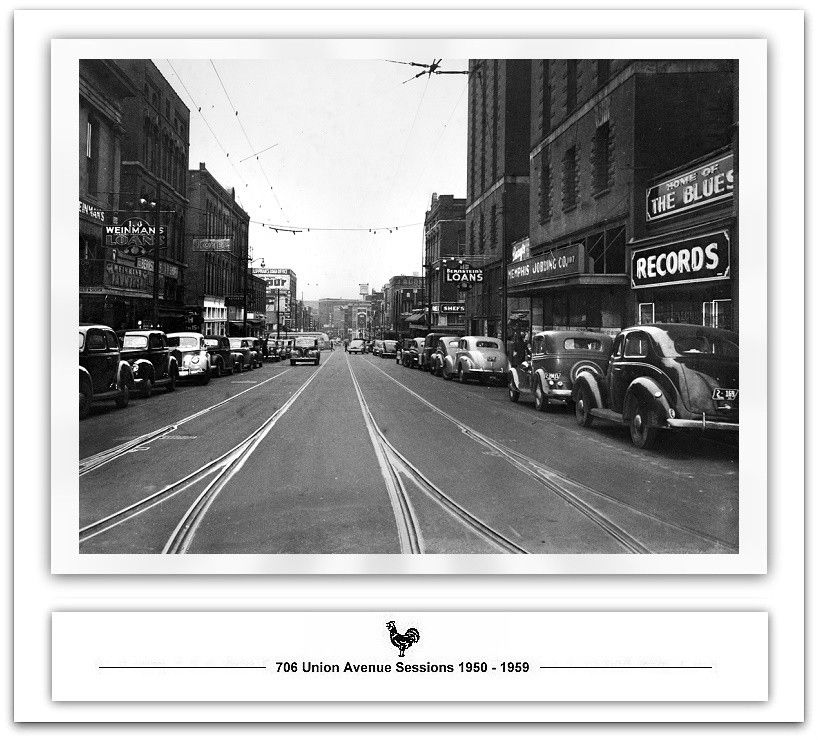

HOME OF THE BLUES RECORD SHOP & LABEL - A UNIQUE PLACE IN MEMPHIS MUSIC HISTORY
H. Scott Prosterman
Memphis’ identity as Home of the Blues (HOB) was promoted by a record store of the same name, operated by Ruben Cherry and his aunt Celia (Goldstein) Camp. The shop opened at 107 Beale St. in 1947, and moved to 147 S. Main in November 1967 before closing in1975. HOB served as a community and networking center for Black and white Memphis musicians, including Elvis and Johnny Cash, who bought many records there. Its special place in Memphis music history is elevated by its own record label from 1960-63. Wolf Lebovitz, another family member, was very involved with many artist contracts and copyright security. He also actively promoted the store and label around the Mid-South, and generated sales.
Cherry was the first to stock Elvis’ “That’s Allright Mama” after the King had been a regular customer. Cherry also employed WHBQ DJ Dewey Phillips to draw customers, who was the first DJ to broadcast Elvis records. At HOB, Black and white patrons would mingle, share music and make new friends. It became a music and cultural melting pot, and a vital ingredient in the cauldron that begat the “Memphis Sound.” Cherry accepted fronts of new music from independent promoters other stores did not, and offered a full range of Rock ‘n’ Roll, R&B, Blues and all genres of music not available elsewhere.
In 1960, HOB initiated its own label, and began recording mostly Blues and R&B musicians at Royal Studios, 1320 South Lauderdale, and also at Sam Phillips Recording, Echo and the Fernwood Studio. Willie Mitchell served as producer for the early sessions, and was historically the most prominent artist to record at HOB, before he went to Hi Records in 1961. At the time, The 5 Royals were the biggest name. Other artists were Roy Brown, Prince Gabe and Fred Ford. Cherry and Ms. Camp were credited with 20 compositions on the HOB label The label had distributions deals with Vee Jay and ABC Paramount to better promote the music, but the reach was mostly local and regional. However, the draw was global and had stars such as Marilyn Monroe, Jackie Wilson and Pat Boone passing through at different times. Johnny Cash was a regular customer when he was recording at Sun; and his 1957 heartbreak, country song, “Home of the Blues” was titled thusly as a tribute to the record store. Cash also made tribute HOB during his Rock ‘n’ Roll Hall of Fame acceptance.
Session players included Lewie Steinberg, 1st bass player for Booker T. & the MG’s before Duck Dunn, who played on other Stax sessions. Al Jackson Sr., father of the MG’s namesake drummer, was the drummer for those sessions. Session contributions by Memphis Jazz greats Phineas Newborn, Jr. George Coleman and Charles Lloyd also illuminate the historical importance of any sides still available. The HOB label spawned a series of subsidiaries including Hara, Sar-Lib, 1st, Rufus, Fre-Ron, Six-o-six and Zap. Those sides are collector’s gold.
Ms. Camp was the financier and made the business decisions, while Cherry signed the artists and managed the contracts. She was the owner of Southern Amusement Company on Madison, which dominated the vending machine, pinball and jukebox distribution in Memphis and throughout the South. The family also held interests in real estate and oil companies, which help finance other music and entertainment ventures, including HOB. Ruben was the front man, who exuded all the erasable, amusing charm that Jewish Beale Street merchants were known for. Some loved him, others said he was difficult.
Enrichment Resources:
https://www.memphisflyer.com/home-of-the-blues
https://theclio.com/entry/39181
